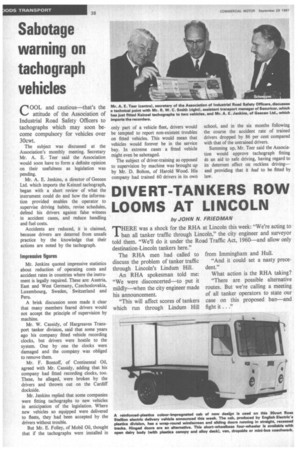Sabotage warning on tachograph vehicles
Page 40

If you've noticed an error in this article please click here to report it so we can fix it.
COOL and cautious—that's the attitude of the Association of Industrial Road Safety Officers to tachographs which may soon become compulsory for vehicles over 30cwt.
The subject was discussed at the Association's monthly meeting. Secretary Mr. A. E. Teer said the Association would soon have to form a definite opinion on their usefulness as legislation was pending.
Mr. A. E. Jenkins, a director of Geecen Ltd. which imports the Keinzel tachograph, began with a short review of what the instrument could do and how the information provided enables the operator to supervise driving habits, revise schedules, defend his drivers against false witness in accident cases, and reduce handling and fuel costs.
Accidents are reduced, it is claimed, because drivers are deterred from unsafe practice by the knowledge that their actions are noted by the tachograph.
Impressive figures
Mr. Jenkins quoted impressive statistics about reduction of operating costs and accident rates in countries where the instrument is legally required. These are: Austria, East and West Germany, Czechoslovakia, Luxembourg, Sweden, Switzerland and Peru.
A brisk discussion soon made it clear that many members feared drivers would not accept the principle of supervision by machine.
Mr. W. Cassidy, of Hargreaves Transport tanker division, said that some years ago his company fitted vehicle recording clocks, but drivers were hostile to the system. One by one the clocks were damaged and the company was obliged to remove them.
Mr. F. Bontoff, of Continental Oil, agreed with Mr. Cassidy, adding that his company had fitted recording clocks, too. These, he alleged, were broken by the drivers and thrown out on the Cardiff dockside.
Mr. Jenkins replied that some companies were fitting tachographs to new vehicles in anticipation of the legislation. Where new vehicles so equipped were delivered to fleets, they had been accepted by the drivers without trouble.
But Mr. E. Folley, of Mobil Oil, thought that if the tachographs were installed in
only part of a vehicle fleet, drivers would be tempted to report non-existent troubles on fitted vehicles. This would mean that vehicles would forever be in the service bay. In extreme cases a fitted vehicle might even be sabotaged.
The subject of driver-training as opposed to supervision by machine was brought up by Mr. D. Bolton, of Harold Wood. His company had trained 60 drivers in its own school, and in the six months following the course the accident rate of trained drivers dropped by 86 per cent compared with that of the untrained drivers.
Summing up, Mr. Teer said the Association would approve tachograph fitting ds an aid to safe driving, having regard to its deterrent effect on reckless driving-and providing that it had to be fitted by law.




































































































































































